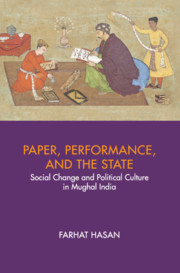Book contents
- Frontmatter
- Dedication
- Contents
- Acknowledgements
- List of Abbreviations
- A Note on Transliteration
- 1 Introduction
- 2 Property and Social Relations: Litigations and Disputes at the Qāzi's Court
- 3 Law as Contested Communication: Literacy, Performativity, and the Legal Order
- 4 Embodiment, Sensoriality, and the Public Sphere: Shifting Popular Perceptions of the State
- 5 State Formation from Below: Authority and Culture in Micro-Spaces
- 6 Towards a Conclusion: The Project of the Nation-State and the Mughal Historian
- Bibliography
- Index
5 - State Formation from Below: Authority and Culture in Micro-Spaces
Published online by Cambridge University Press: 07 August 2021
- Frontmatter
- Dedication
- Contents
- Acknowledgements
- List of Abbreviations
- A Note on Transliteration
- 1 Introduction
- 2 Property and Social Relations: Litigations and Disputes at the Qāzi's Court
- 3 Law as Contested Communication: Literacy, Performativity, and the Legal Order
- 4 Embodiment, Sensoriality, and the Public Sphere: Shifting Popular Perceptions of the State
- 5 State Formation from Below: Authority and Culture in Micro-Spaces
- 6 Towards a Conclusion: The Project of the Nation-State and the Mughal Historian
- Bibliography
- Index
Summary
Having pursued the state in sociocultural spaces – household assets, property transactions, intra-familial disputes and inter-community conflicts, dispute resolution, and social communication – we get a sense of the depth of state– society relations, and the extent to which it was a ‘cultural formation’. In exploring the state's participation in cultural spaces, we have not focused on events that were spectacular, or the ones that were transregional in their reach and scope; instead, we have looked at the state in its routine, day-to-day forms, and have hopefully, gained fresh perspectives and insights concerning Mughal state formation from below. This study has found merit in approaching the state within a state-in-society perspective, and one obvious realization that dawns on us from such an exercise is that the Mughal empire was not a monolithic entity, and did not exercise undivided and exclusive authority; it functioned, for much of its long, chequered existence by co-sharing sovereignty with other regional and local claimants to power. The rule ‘structure’ – if it was at all a ‘structure’ – was marked by complex and contestable relations between its varied and extremely heterogeneous components; the state was only one among several institutions and networks of rule in the localities.
The view of the state, dominant among historians, as the sole and exclusive source of authority, disengaged from social forces, is one that has been obtained by focusing on the state as a top-down organizational entity, defined by the imperial court and its instruments of rule. This view obviously ignores dynamic processes of ‘state-making from below’, in particular, the vibrant interactions between the state and social forces. For us to appreciate the historical significance of these interactions, we need to look at the state not as an organization, but as a set of practices. The state, after all, was not constituted by its structural elements alone, but also, and perhaps more importantly, by its participation in what Joel S. Migdal terms as ‘the society's multiple arenas of domination and opposition’. In moving to these arenas for studying the state, we obviously need to make a spatial shift away from the imperial centre – its organizational set-up, formal institutional arrangements, and so on – to state–society encounters in the localities.
The state as a sociocultural formation: engaging with Mughal historiography
For a long time, historians have looked at the state in reified terms, as enjoying absolute agency over the societies it governed.
- Type
- Chapter
- Information
- Paper, Performance, and the StateSocial Change and Political Culture in Mughal India, pp. 96 - 120Publisher: Cambridge University PressPrint publication year: 2021



